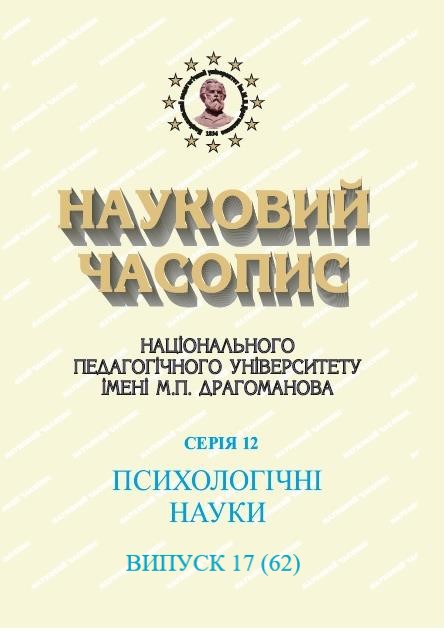MODEL OF PROFESSIONAL ADAPTATION OF JUNIOR OFFICERS TO THE MILITARY-PROFESSIONAL ACTIVITY TAKING INTO ACCOUNT THE ACTION PSYCHOPHYCYNICHIOLOGISTS
DOI:
https://doi.org/10.31392/NPU-nc.series12.2022.17(62).05Keywords:
military-professional activity, professional adaptation, psycho physiological factors, model, becoming an officer.Abstract
The article is devoted to forecasting the process of adaptation, functionality assessment, the degree of psychophysiological readiness of the organism, all that will provide training and combat activities. The most dynamic influence of adaptogenic factors is observed at the initial stage of military service, in new conditions, requiring the ability to quickly adapt to the specifics of military-professional activities. Scientific and theoretical material on the issues of professional adaptation of junior officers of the Armed Forces of Ukraine is analyzed, which would consider the characteristics of the adaptive psychophysical capabilities of the body of servicemen. It is concluded that despite the steady interest in the professional adaptation problem of the military sphere, there are still many issues related to the phenomenology, structure and mechanisms that provide an opportunity to achieve balance in “military man – military-professional activities” system in the ever-changing conditions. This process is complicated by the fact that adaptation and adaptation processes in the military sphere involve the study of all dimensions of this complex phenomenon, which on the one hand is procedural, because it leads to the formation of new mental qualities, internal changes, external active adaptation, self-change existence (A.O. Rean, A.R. Kudashev, O.A. Baranov), taking into account the action of a complex of various factors; on the other hand, it is effective because it makes it possible to state the level and degree of adaptability of the soldier at a certain point in time. In any case, the professional adaptation of a serviceman, in particular, the officer takes place in a professional environment and determines the strategy of his professional development and success in it.
Undoubtedly, such issues like the development and mobilization of the body's defenses against negative factors, compensation for disorders as a result of the pathological process of communication and regulation, and finally, forecasting the characteristics of military work and life cannot be solved without knowledge of psychophysiological nature and mechanisms of adaptation. It is suggested that the formation and implementation of the model of junior officer professional adaptation should contribute to the achievement of strategic goals of the Ukrainian army in peacetime and wartime.
References
- Kokun, O.M. (2006). Psykhofiziolohiia [Psychophysiology] Kyiv : Tsentr navchalnoi literatury [in Ukrainian].
- Korolchuk, M.S. (2003). Psykhofiziolohiia diialnosti: pidruchnyk dlia studentiv vyshchykh navchalnykh zakladiv [Psychophysiology of activity: textbook for students of higher educational institutions]. Kyiv: Elha, Nika-Tsentr [in Ukrainian].
- Klymenko, V.V. (1997) Mekhanizmy psykhomotoryky liudyny [Mechanisms of human psychomotor]. Kyiv [in Ukrainian].
- Lazurenko, S.I. (2010) Rozvytok psykhomotornykh yakostei studentiv tekhnichnykh VNZ [Development of psychomotor qualities of students of technical universities] Kyiv : DP Informatsiino-analitychne ahentstvo [in Ukrainian].
- Lazurenko, S.I. (2011) Psykhofiziolohiia ustanovok v rehuliatsii motoryky liudyny [Psychophysiology of installations in the regulation of human motility]. Kyiv : Universytet «Ukraina» [in Ukrainian].
- Maklakov, A.G. (2001). Lichnostnyj adaptacionnyj potencial: ego mobilizaciya i prognozirovanie v jekstremalnyh usloviyah [Personal adaptive potential: its mobilization and forecasting in extreme conditions]. Psihologicheskij zhurnal – Psychological Journal, 22 (1), 16–24. Retrieved from https://studfile.net/preview/4225080/page:3/ [in Russian].
- Ovsiannikova, V.V. (2013). Problemy psykholohichnoi adaptatsii personalu orhanizatsii [Problems of psychological adaptation of the organizations personnel]. Problemy suchasnoi psykholohii – Problems of modern psychology, 2, 85–91. Retrieved from http://nbuv.gov.ua/UJRN/pspz_2013_2_18 [in Ukrainian].
- Osodlo, V.I. (2012). Psykholohiia profesiinoho stanovlennia ofitsera [Psychology of professional formation of an officer]. Kyiv : Zoloti Vorota [in Ukrainian].
- Osodlo, V.I. (2019). Vplyv sndyvidualno-psykholohichnykh vlastyvostei osobystosti na podolannia stresovykh sytuasii [The influence of individual psychological properties of the individual on overcoming stressful situations]. Psykhoiohichnyi zhurnal – Psychological Journal, 3. Retrieved from http://psyj.udpu.edu.ua/article/view/195941 [in Ukrainian].
- Okhremenko, O.R. (2004). Diialnist u skladnykh, napruzhenykh ta ekstremalnykh umovakh [Activities in difficult, stressful and extreme conditions]. Kyiv : Natsionalna akademiia oborony Ukrainy [in Ukrainian].
- Slovnyk inshomovnykh sliv [Dictionary of Foreign Words], (1977). In O. Maksymenko (Ed.). Kyiv : HRURE [in Ukrainian].
- Rean, A.A. (2006). Psihologiya adaptacii lichnosti. Analiz. Teoriya. Praktika [Psychology of personality adaptation. Theory. Practice]. Saint Petersburg : PRAJM-EVROZNAK [in Russian].
- Markina, I.A., & Shkurko, V.V. (2012). Stratehiia vyrobnychoi adaptatsii personalu pidpryiemstva v suchasnykh umovakh rozvytku ekonomiky [Strategy of virobnichoi adaptatsii to personnel of entrepreneurship in the minds of the development of economics.]. Ekonomika Ukrainy: realii, perspektyvy rozvytku rynkovykh vidnosyn – Economy of Ukraine: realities, prospects of market relations development, 20, 544–553. Kyiv : NDI Problemy liudyny [in Ukrainian].

